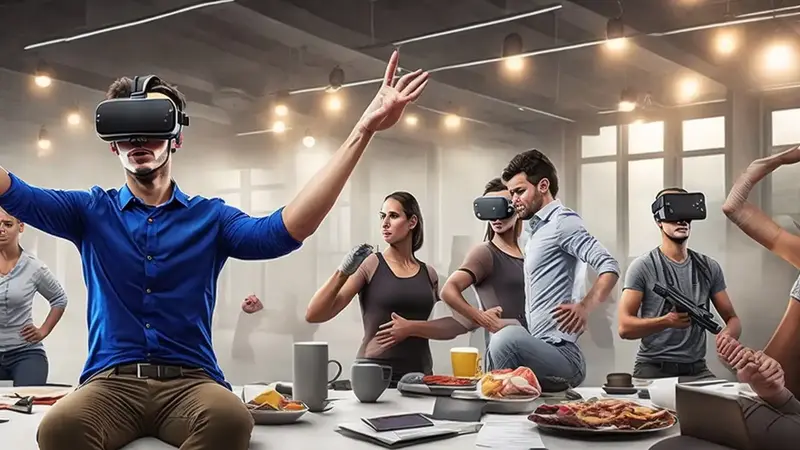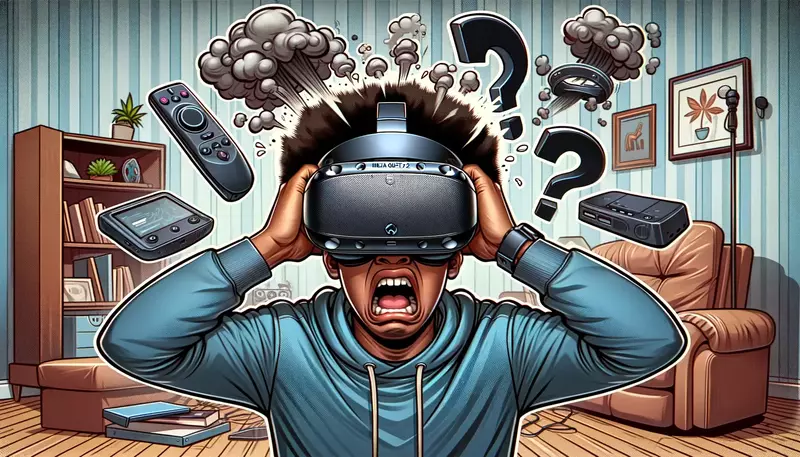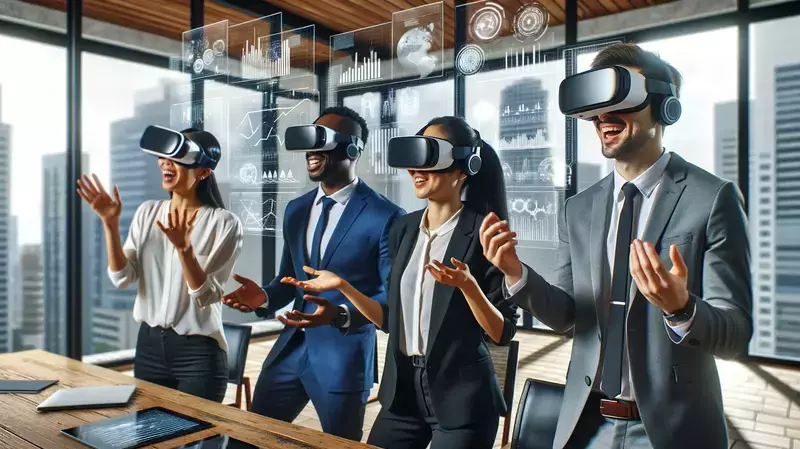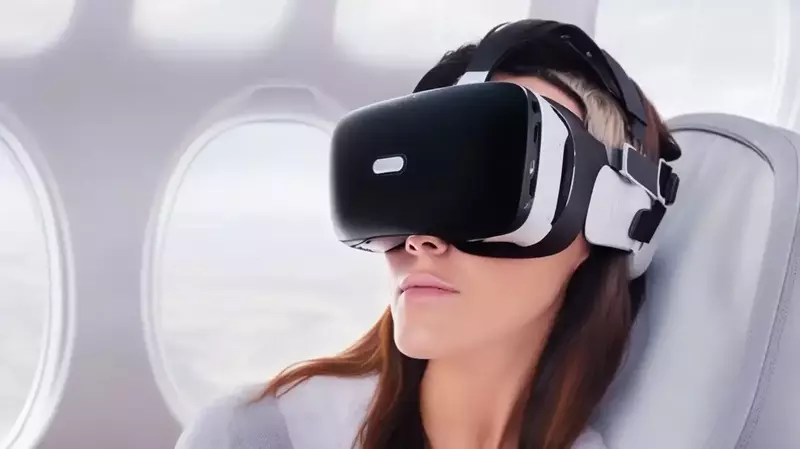This site contains affiliate links to products, and we may receive a commission for purchases made through these links.
Is virtual reality a good career choice for those looking to enter the rapidly growing technology industry? As the virtual world continues to expand, many are considering careers in this exciting field.
To help you decide if a career in virtual reality is right for you, this blog post will explore the different aspects of working in this rapidly expanding field.

Key Takeaways:
- Virtual reality (VR) is an immersive technology that provides high-quality experiences for gaming enthusiasts, explorers, or anyone looking to learn about virtual reality.
- VR has applications beyond gaming, with industries like education, healthcare, architecture, and automotive increasingly utilizing its potential.
- Pursuing a career in VR development can be a good choice, with potential job opportunities in various sectors.
- Skills required for a career in VR include technical skills like computer science, software engineering, graphics programming, and user interface design, as well as creative skills like 3D modeling, artistic ability, and storytelling.
- The VR industry offers competitive salaries, growth potential, and additional benefits such as stock options, flexible work arrangements, and career development resources.
- To start a career in VR, consider gaining an educational background in computer science or engineering, honing technical and creative skills, building a portfolio of projects, networking, and considering internships or entry-level positions.
What is Virtual Reality?
Virtual reality (VR) is an immersive technology that transports users into a simulated environment, allowing them to interact with and experience the digital world as if it were real.
VR has come a long way since its inception, and today’s devices like Oculus Rift, Meta Quest, HTC Vive, and PlayStation VR provide high-quality experiences for gaming enthusiasts, explorers, or anyone looking to learn about virtual reality.
VR has multiple uses beyond gaming, with industries such as education, healthcare, architecture, and automotive increasingly taking advantage of its potential. For instance:
- Education: Virtual classrooms can help students understand complex concepts through interactive simulations.
- Healthcare: Medical professionals use VR for training purposes or even conducting remote surgeries using robotic systems.
- Architecture: Architects can create detailed walkthroughs of their designs in a virtual environment before construction begins.
- Automotive: Car manufacturers utilize VR to test vehicle safety features without putting drivers at risk on real roads.
In addition to these practical use cases, there are also emerging forms of entertainment, such as social platforms where users can meet up in the virtual world or augmented reality (AR), which combines elements from both the physical and digital realms.
With so many potential applications across different sectors of society – from professional lives to leisure activities – it’s no wonder that interest in pursuing careers within this field continues growing exponentially.
If you’re considering entering the realm of virtual reality development yourself but aren’t sure whether it would be a good career choice, read on. This piece looks at the need for VR roles, what to expect in terms of remuneration, what abilities are necessary, and how to begin your journey toward a prosperous career in this thrilling sector.
A digitally-created realm providing users with the capacity to experience and investigate simulated scenarios is what virtual reality entails. Given its widespread adoption, it’s understandable that many are pondering whether a virtual reality career is possible.
Is Virtual Reality a Good Career Choice?
As technology progresses, the need for knowledgeable professionals in VR and AR is increasing. With applications spanning across various industries such as gaming, healthcare, education, and entertainment, pursuing a career in VR can be both exciting and rewarding.
Job Opportunities in the VR Industry
The job market for VR professionals has been growing steadily over recent years, with companies like Oculus Rift, Google, and Microsoft HoloLens actively seeking talented individuals to join their teams.
Positions range from software engineers to 3D artists and UX designers; there’s something for everyone interested in this cutting-edge field.
High Demand for Skilled Professionals
PwC’s report forecasts that VR/AR will be a major driver of economic growth, with its contribution to global GDP projected to reach $1.5 trillion by 2030 – an exponential surge in demand for skilled professionals with technical know-how and creative problem-solving capabilities.
This growth translates into an increasing need for qualified candidates who possess both technical expertise and creative problem-solving abilities – skills that are highly sought after among employers.
Diverse Industries Benefiting from VR Technology
- Gaming: The most obvious application of virtual reality is in gaming, where developers create immersive experiences using platforms like PlayStation VR or HTC Vive.
- Healthcare: Medical professionals use AR/VR tools to simulate surgeries or visualize complex medical data during diagnostic procedures.
- Education: Virtual reality can be used to create interactive learning environments, allowing students to explore subjects in a more engaging manner.
- Entertainment: From virtual concerts to immersive movie experiences, VR is revolutionizing the way we consume content.
Career Path Flexibility
The VR industry’s dynamic nature allows ample opportunities to grow and evolve within your professional life. With a strong computer science or software engineering foundation, you may choose from various career paths, such as becoming an XR developer or specializing in UX/UI design for virtual worlds.
As technology advances further, new roles will continue emerging – ensuring that there’s never a dull moment when working with virtual reality.
Networking Opportunities
To stay ahead of the curve and keep up with advancements in this fast-paced field, it’s essential to connect with other professionals who share similar interests.
Attending conferences like AWE (Augmented World Expo), joining online forums dedicated to VR development, or participating in local meetups are excellent ways of expanding your network while staying informed about current trends and innovations.
VR is an expanding area with plenty of possibilities for interesting job prospects, so it’s essential to recognize the abilities required for such a career. With this in mind, let us explore what skills are needed to succeed in virtual reality development.
What Skills Are Needed to Pursue a Career in Virtual Reality?
In order to excel in the rapidly evolving world of virtual reality, it’s essential for aspiring professionals to possess a diverse skill set that combines both technical and creative abilities.
Here, we’ll discuss some of the key skills required for various roles within the VR industry.
Technical Skills
- Computer Science: A strong foundation in computer science is crucial for understanding how virtual worlds are created and maintained. Proficiency in programming languages such as C++, Python, or JavaScript is essential for developing and maintaining virtual worlds.
- Software Engineering: Developing immersive experiences requires expertise in software engineering principles like object-oriented design and agile development methodologies.
- Graphics Programming: Proficiency with graphics APIs like OpenGL or DirectX is necessary for creating realistic visuals within virtual environments.
- User Interface Design: Creating intuitive user interfaces is critical for ensuring seamless interaction between users and their digital surroundings.
Creative Skills
- 3D Modeling: Creating 3D models and animations is a key skill required for designing virtual environments. Autodesk 3ds Max and Maya are popular software tools used for this purpose.
- Artistic Ability: A strong sense of aesthetics and design is important for creating visually appealing virtual environments.
- Storytelling: The ability to craft compelling narratives is essential for creating engaging virtual experiences.
While a bachelor’s degree in computer science or a related field is typically required for most VR jobs, a master’s degree can provide a competitive edge. Additionally, experience with VR development platforms such as Oculus Rift or HTC Vive can be beneficial.
Pursuing a virtual reality career can be a rewarding career path for those with the necessary skills and passion for the field. With the continued growth of the VR industry, many career opportunities are available for software engineers, computer scientists, and creative professionals.
Comprehending coding and software engineering is fundamental for anyone wanting to venture into virtual reality.
Additionally, 3D modeling and animation knowledge can be beneficial when entering the field. Moving on, let’s explore how much money you can make with a career in virtual reality.
“Unlock your potential in the booming VR industry. Develop technical and creative skills to pursue a rewarding career in virtual reality. #VRcareers #techjobs”Click to Tweet
How Much Money Can You Make in Virtual Reality?
In the rapidly evolving world of virtual reality, professionals with the right skills and expertise can expect to earn competitive salaries.
The amount you make will depend on factors such as your role, experience level, location, and industry sector.
Average Salaries for VR Professionals
The average salary for a virtual reality developer in the United States is typically around $75,000 annually; however, this figure can vary significantly depending on role and other factors.
However, this figure can vary widely depending on several factors:
- Role: Different roles within VR development come with different salary expectations. For example, software engineers working on VR projects may earn more than artists or designers.
- Experience Level: As with any profession, experienced professionals tend to command higher salaries than those just starting out in their careers.
- Location: Salaries also differ based on geographical location; developers living in areas with a high cost of living typically receive higher compensation compared to those residing elsewhere.
Growth Potential
The demand for skilled virtual reality professionals is expected to grow significantly over the next few years due to increased investment from major tech companies like Oculus Rift and Autodesk 3D.
The demand for skilled VR professionals is anticipated to bring forth more job opportunities and a rise in salaries as businesses strive to acquire the most proficient personnel.
Beyond Salary: Additional Benefits
In addition to base pay rates, many employers offer additional benefits that add value beyond monetary compensation when considering a career path in virtual reality development.
These benefits may include:
- Stock options or equity grants: Some companies offer stock options or equity grants as part of their compensation packages, which can provide significant financial rewards if the company is successful.
- Flexible work arrangements: Many VR developers enjoy flexible working hours and remote work opportunities, allowing them to easily balance their professional lives with personal commitments.
- Career development resources: Employers often invest in training programs and other career development resources for their employees, helping them stay current on industry trends and advance within the organization.
In conclusion, a virtual reality career offers competitive salaries and potential growth opportunities. By staying informed about market trends and developing your skills through education and experience, you can position yourself for success in this exciting field.
Virtual reality can be a lucrative career path with the right skills and dedication. To succeed in the virtual reality field, one must have the right skills and commitment to grow professionally.
How Do I Start a Career in Virtual Reality?
To begin a career in virtual reality, gaining an appropriate educational background is the first step. Here’s how:
Educational Background
While it’s not always necessary, having a bachelor’s degree or even a master’s degree in computer science, software engineering, or computer engineering can provide an excellent foundation for your VR career.
These programs typically cover essential topics such as programming languages, data structures, algorithms, and more.
Hone Your Skills
To succeed in virtual reality development, having both technical and creative proficiency is essential.
Some key skills required include proficiency with programming languages like C++, C#, or Python; experience with 3D modeling tools such as Autodesk 3D; understanding of game engines like Unity or Unreal Engine; and familiarity with augmented reality platforms like ARKit or ARCore.
Build Your Portfolio
- Create personal projects that showcase your abilities as a VR developer – these could be simple games or interactive experiences using popular hardware like Oculus Quest.
- Participate in hackathons and game jams where you’ll work on creating innovative solutions within tight deadlines – this will help build your teamwork skills while also growing your network within the industry.
- Publish your work online through platforms such as GitHub so prospective employers can see examples of what you’re capable of.
Networking and Job Hunting
As with any career path, networking is essential for finding job opportunities in virtual reality. Attend industry events such as AWE (Augmented World Expo), conferences, and meetups to connect with other professionals in the field.
Additionally, make use of online resources like LinkedIn to discover VR jobs and join relevant groups where you can engage with others who share your passion for this technology.
Consider Internships or Entry-Level Positions
If you’re just starting out in your professional life, consider applying for internships or entry-level positions at companies specializing in virtual reality development.
This will provide invaluable real-world experience while also helping you establish connections within the industry that could lead to future career opportunities.
FAQs in Relation to Is Virtual Reality a Good Career
Is VR a Good Field?
Yes, Virtual Reality (VR) is a promising and rapidly growing field. It offers diverse career opportunities in various industries, such as gaming, healthcare, education, and entertainment. With the increasing demand for immersive experiences and technological advancements, pursuing a VR career can be exciting and rewarding.
Are AR and VR a Good Career?
Both Augmented Reality (AR) and Virtual Reality (VR) are excellent career choices due to their high growth potential across multiple sectors. As the technology continues to evolve, skilled professionals with expertise in AR/VR development will remain highly sought after by employers looking to create innovative applications.
Is Virtual Reality in Demand?
Virtual reality is indeed in high demand as it has become an essential part of numerous industries like gaming, architecture, automotive design, healthcare, training simulations, and education, among others. The market for virtual reality products is expected to grow significantly over the next few years.
What Does Someone in Virtual Reality Career Do?
A professional working within the realm of virtual reality may develop immersive software applications or hardware solutions, depending on their area of expertise. Their responsibilities could include designing 3D models or environments using tools like Autodesk 3D or Unity Engine; programming interactive features; testing user experience; collaborating with multidisciplinary teams; creating prototypes; and staying up-to-date with industry trends.
!! For more information about the different VR headsets on the market, check out this product specification list.
Final Thoughts
Virtual reality is a rapidly growing industry with numerous career opportunities for individuals who possess the necessary skills. To excel in a career in VR, one must possess the technical skills of software engineering and computer science as well as experience with XR technologies such as Oculus Rift and Autodesk 3D.
With the potential to earn high salaries and work on exciting projects that push the boundaries of what’s possible, pursuing a career in virtual reality can be an excellent choice for those interested in gaming, exploration, or learning.

Espen
Espen is the Director of PursuitMeta and has written extensively about Virtual Reality and VR Headsets for years. He is a consumer product expert and has personally tested VR Headsets for the last decade.




Leave a Reply